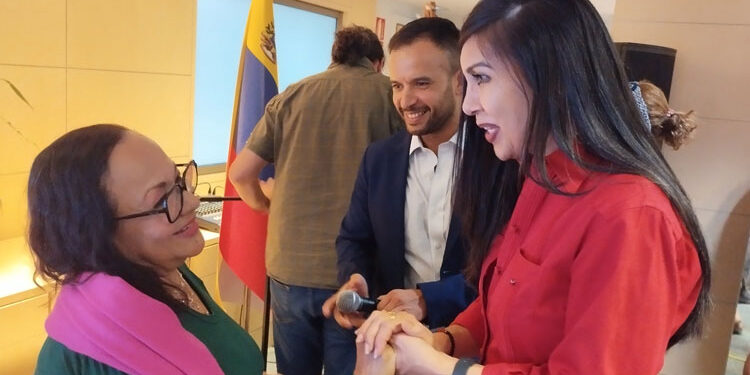Text and photo: Juan David Latorre
Gladys Gutiérrez Alvarado, Venezuelan ambassador, commemorated last Monday the 71st anniversary of the birth of former President Hugo Chávez and the first anniversary of President Nicolás Maduro’s victory in the general elections held last year.
“71 years ago,” the Venezuelan ambassador began her speech, “the birth of Commander Chávez took place, the Commander President, as we still call him, for his thoughts, his words, and his actions that embody the Bolivarian Revolution. Furthermore, he forged his philosophy and uprightly maintained his direction, his permanent commitment, which is reflected in two high moments in our recent history, which are, for now, his first and last public appearances.”
“The first,” he continued, “when he pointed out that Venezuela must definitively move toward a better future, on February 4, 1992, and the second, for now, on December 8, 2012, when he warned that we now have a passionate people, a people capable of rebuilding the work, the work of the revolution, and finishing the construction and consolidation of the good homeland, the beautiful homeland, the homeland of the future. These are two moments that reveal his selflessness, his greatness, his sublime love for the truth—that is what he conveyed.”
Ambassador Gladys Gutiérrez Alvarado continued by referring to former President Chávez as an “authentic revolutionary, a staunch defender of the dispossessed, who left a profound mark, with great intensity and unwavering faith, on the collective soul of the world’s humble, not only in our country, but also, of course, in his own country, but who also transcended borders. In the past, Venezuela was always associated with wealth—let’s say, with oil—and now it is better known for its solidarity for international justice, for the creation and assistance it provided, and for how it contributed to forging institutions such as CELAC, MERCOSUR, UNASUR, ALBA, Petrocaribe, etc.”
“Commander President Chávez,” he indicated, “left a legacy for history that was also due to his practical actions, always aimed at guiding creative thinking to develop a growing radicalism. We find ourselves in that moment. As we all know, after his physical disappearance, Nicolás Maduro assumed the presidency on April 14, 2013, amidst extremely serious threats from food shortages, the economic recovery, street violence, and paramilitary violence—in other words, there was a real siege. Later, with unilateral coercive measures, however, the president, with the support of the conscious people, has managed to successfully overcome and overcome this entire counterrevolutionary
onslaught.”
To conclude the event, a cultural activity was offered by singer Aurita Urribarri, who dedicated a few songs to all those in attendance.







